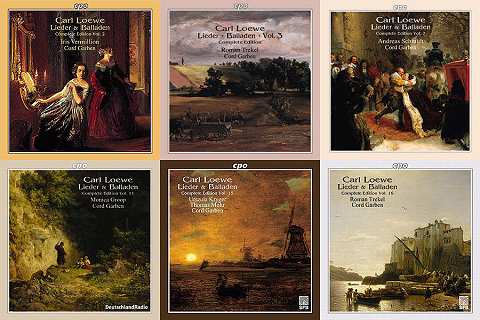|
<< -- 6 -- Roderic Dunnett THE NORTHERN SCHUBERT

But it is the best songs, which have just been collected on the CPO label,
which promise most to restore Loewe to his place in the front rank. As Simon
Over emphasised, it is is not just the ballads -- Prinz Eugen, the
uneven but ingenious Der Schatzgräber ('The Treasure-seeker'),
or the wonderful The Lovers' Tomb ('Die Gruft der Liebenden') -- characterful
though these are, which make him stand out. There is much else : Trommelständchen
has a hint of Mahler in waiting; The Clock (equated with the singer's
beating heart) or The Walking Bell (which blithely chases a truanting
child back into church) are both wonderful conceits, in the music as much
as the words. First Love has the delicacy and charm of Weber.
Loving Burial gives one of those rare hints of Loewe edging towards
the new refinement of Schumann. Kleiner Haushalt is bright and tripping,
Will O-the-Wisps equally sprightly, though this time also spooky.
The Pilgrim from St Just (marvellously sung by the bass, Kurt Moll)
is a masterly evocation of gloom over a murky ostinato. A Girl's Desires
almost bursts out into Franz Lehar. Szene aus Faust ('Ah, Lady of
Sorrows'), sung by Brigitte Fassbaender, is one of the most astonishing
songs of all, positively bursting into the major to evoke Goethe gazing
out of the window, bedewing his flowers with tears. Not all may be up to
Schubert; the delicious Elvershöh ('Elves' Hill') most certainly
is.

So -- was the village schoolmaster's son from Handel's city of Halle (Loewe
was born in the village of Löbejün in Sachsen-Anhalt), who was
well known to the Berlin circle of Zelter and Reichardt (both familiars
of Goethe himself), whom Weber himself trusted to prepare an orchestra for
him, and who spent most of his mature years as music director at the Jacobskirche
in Stettin -- modern Szczezin in Poland -- Loewe's heart lies buried in a
pillar next to the organ there -- a real force to be reckoned with in 19th
century Lieder-writing?

All the evidence is that he was. Much of our information about him comes
from his congenial autobiography, first published posthumously in 1870 (and
reprinted by the Handel-Haus museum, Halle). When the young composer made
the obligatory pilgrimage, aged twenty two, to meet the ageing Goethe, his
youthful settings of the great poet tucked under his arm, he found himself
without a piano, and unable to sing. It would be criminal not to give Loewe
his voice now.
Copyright © 7 February 2002
Roderic Dunnett, Coventry, UK
 INTERNATIONAL CARL LOEWE SOCIETY
LISTEN TO LOEWE SONGS AND PIANO SONATAS ON CPO
A LOEWE SYMPHONY & PIANO CONCERTO ON KOCH
AN HISTORIC CARL LOEWE RECORDING
CARL LOEWE AT AMAZON.COM
FISCHER-DIESKAU SINGS LOEWE ON DG
<< Music
& Vision home
Igor Kipnis >>
INTERNATIONAL CARL LOEWE SOCIETY
LISTEN TO LOEWE SONGS AND PIANO SONATAS ON CPO
A LOEWE SYMPHONY & PIANO CONCERTO ON KOCH
AN HISTORIC CARL LOEWE RECORDING
CARL LOEWE AT AMAZON.COM
FISCHER-DIESKAU SINGS LOEWE ON DG
<< Music
& Vision home
Igor Kipnis >>
|

